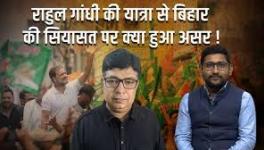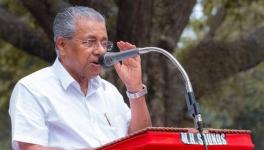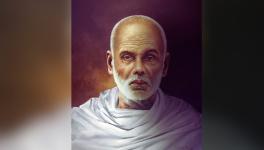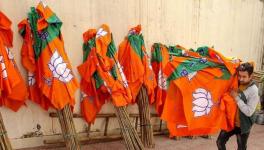Creditable performance by LDF in Assembly Elections - Sukumar Muralidharan
The LDF misses victory by a whisker in the 2011 Assembly elections in the state. The good image of the outgoing VS Achuthanandan led government was a factor responsible for the creditable performance. Sukumar Muralidharan comments in an interview with Newsclick
Transcript-
Srinivasan Ramani (SR) - Hello and welcome to Newsclick. In what has been called a near miraculous result, the Left Democratic Front in Kerala nearly managed to defeat the United Democratic Front in an effort to buck the traditional anti-incumbency trend in the state.
We have with us Sukumar Muralidharan, senior political analyst, to discuss the result of the assembly elections in Kerala. The LDF performed badly in the 2009 Lok Sabha elections and post that even in the local body elections they had suffered a setback. Yet they managed to nearly win this election, losing to the UDF by a margin of just 4 seats. How did this happen?
Sukumar Muralidharan (SM) - Well, I think, finally, the record in administration came to count for something when the people lined up to vote on April 13th, and this ministry has had a fairly good record of governance. The ministers, all of them, have had a record regarded by the public as having given an honest shot to most of the ambitious items on their agenda. Some may not have succeeded but they were seen to not have succeeded for good reasons, because they had very strong vested interests opposing them and above all that the adminstrartion wewas seen to emanate from the commitment to probity and the basic comitmant to clean politics of the chief minister, Mr. V.S. Achutanandan. So I think that finally swung 3 to 4 percent of the vote in favour of the LDF and that enabled them to come out literally in a dead heat with the UDF.
SR – So in a sense, if the image of factionalism had not pervaded the CPI(M), the left could have performed even better than what it had done now, in the Lok Sabha elections as well?
SM – No, because state assemble elections and national parliamentary elections always have different agendas and the left except for in 2004, when they won all but one seat in the state has naver had a great performance in the parliament elections, but they have always been a very close contender in assembly elections, and winners in alternate elections. The question of factionalism is different. Of course that dent the image of the LDF, in particular the principal party of the front, the CPI(M). But it was not seen to have impeded the performance of the ministry, unlike in the Congress. Now factionalism is not unique to the CPI(M). It is a feature of all the parties in Kerala. Notably, the Congress and in the Congress it has been seen to have impinged on their performance in government. So unlike that, this didn’t seem, to the lay understanding, to have had that much of an effect on their performance.
SR – Even the UDF’s performance is a little bit unique, in that sense, or strange, rather. The Congress seems to not have done so well. It is now the second largest party in Kerala, after the CPI(M). It’s coalition partners, on the other hand, the Muslim League and the Kerala Congress (Mani) seem to have done far better. What is the reason for this disparity?
SM – Well the Congress is very slow off its blocks. If you look back at the early stages of the nominations and the finalization of the seats, the congress had a very tense period of bargaining between the main factions. And underlying the factional politics in the Congress is the rivalry between the upper caste Hindu and the upper caste Christian groups, which are the two most powerful groups within the congress. Represented on one side by Ramesh Chennithala and on the other side by Oommen Chandy. So they took a while to sort out those factional difficulties, unlike the CPI(M), which decided early on
that they couldn’t afford to keep V.S. Achutanandan out and brought him in and anointed him as the leader of the campaign very early, whereas the Congress took a longer time to do that. I think thosefactional tensions didn’t quite settle down, even during the campaign and they did have an impact, finally, in the balloting and the way that the votes fell.
SR- The IUML seems to have done well, despite its image of harboring someone who is identified with the ice cream parlour case. How is it that the IUML has been consistently managing to retain its stronghold?
SM – Well the Muslim League only had two bad years, one was 2004, when they lost the 2 parliament seats that they have always won and in the last assembly elections in 2006, when they won about half the number of votes that they usually win. So this time, actually speaking, is a return to true form for the Muslim League. The reason is complex. We need to look at why the so called sectarian parties like the Kerala Congress (Mani) and the Muslim League have done so much better than the so called non-sectarian, non-denominational parties like the Congress. It seems to be the case that the religious leadership, or communal leadership, may have played a role in mobilizing the flock into voting solidly as a phalanx behind these parties. The Church certainly had a role in alerting its flock as to whom they should be voting for and the Muslim communal leadership also, which in many senses is coterminous with the IUML, had a similar role.
SR - The left’s performance, in its traditional strongholds, like Kannur, for example, seems to be wanting, whereas, surprisingly, the left seems to have done well in areas where they traditionally are weak. Was the delimitation factor responsible for its weak performance in Kannur, for example?
SM – Delimitation may be a factor but it needs a lot of analysis, which is a complex technical issue, which needs to be looked at very carefully. But, what is crucial about Kannur is that the left lost quite a few seats there and this is where the organizational leadership of the CPI(M) really comes from. Maybe some of the factional politics within the party played itself out in the local constituencies. That may account for part of this.
Now, if you remember 1996, when VS Achutanandan was first projected as the chief ministerial candidate of the left, he lost from a seat in Allepy district, which was regarded as one of the safest seats for the Left. That was obviously put down to, for very good reason, some internal factional enmity. Some similar factors could be at work in this election that need to be looked at and I’m sure it will be looked at.
SR – With the UDF, it seems that they are not starting on a strong footing. Already there is talk about some intrigue between the coalition partners and also the factional differences within the Congress. Their margins of victory are narrow. Do you think that this is going to be a stable government?
SM- Well it is going to be a challenge. It certainly is going to be a challenge because the two main sectarian parties may use that once again. The Kerala Congress (Mani) and the Muslim League, together have the same strength, maybe more, as the Congress and they will obviously demand commensurate share in the ministerial births, apart from the usual kind of bargain that is struck. The Kerala Congress (Mani) usually likes to take portfolios such as revenue and the Muslim League likes to take portfolios like education. This is because they have strong stakes in the education sector and that is part of the reason why they mobilize strongly, in this election, against the Left because the Left proposed reforms in the education sector, which would directly threaten this interest. Now they will obviously demand more than that and the Congress will have to settle its own internal dynamics. This problem of accommodating allies is an additional complication to the picture.
First they have to deal with their own internal dynamics of the Chennithala faction and the Oomen Chaandy faction and then there is the additional complication of K. Muralidharan being brought back into the party- K. Karunakaran's son, who was out of the party because of his persistent mischief mongering- now has been brought back. So they have asked for more difficulties within and on top of that, they have to deal with larger alliance partners.
SR - So there is going to be a lot of political intrigue. One larger question, related to the performance of the left, many say that the performance of the left in Kerala is some kind of solace compared to the battering they have got in Bengal. Do you agree with that assessment?
SM - Well for the Left, obviously, it would have been better if they had managed to win or at least run them to a dead heat. They finally lost by a margin of four seats. They will have to sit in the opposition but obviously there is a great incentive to keep up the fight and to prepare for maybe another electoral contest in the not too distant future. This assembly may not run its full five year course. It may or it may not. The challenge of keeping up a credible opposition and maintaining it's sense of seriousness of purpose and it's commitment to basic values that remains and organizationally the challenges are not as acute as they face in Bengal because in West Bengal they have to go through a completely revamp of organisational machinery and there because they've been used to three-and-a-half uninterrupted decades of power people are well entrenched they're not going to give up those positions, whereas in Kerala, they are used to giving up these positions every five years because they've been alternating power all these years, so nobody's going to hang on to a position in a manner that threatens the party's internal cohesiveness. So in that sense it's a easier situation in Kerala to deal with and yes in the midst of the shambles of West Bengal that is some solace in the better performance in Kerala.
Get the latest reports & analysis with people's perspective on Protests, movements & deep analytical videos, discussions of the current affairs in your Telegram app. Subscribe to NewsClick's Telegram channel & get Real-Time updates on stories, as they get published on our website.
























